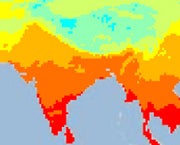
Availability of data, however, is only one piece of the puzzle. For example, while the Climate Change Knowledge Portal helps users interpret climate data in the context of development, it does not by itself provide solutions for all sectors or users. So what can we do to encourage the transformation of data into simple and innovative solutions and decision-making tools that accelerate climate resilient development?
Accelerating this transformation is the impetus behind Apps For Climate, an innovation contest currently underway and running through March 16 2012. Apps For Climate encourages people or organizations (World Bank employees are not eligible) to create climate data “apps”—an intentionally ambiguous term for anything from a website to a mobile app to a widget—and enter them in the contest. Winners, as determined by a judging panel, receive prizes up to $15,000, along with public recognition for their efforts. Such contests are increasingly popular tools for organizations to encourage innovative thinking and engagement beyond their traditional audiences. For instance, Apps For Development, the World Bank competition on which Apps For Climate is modeled, received over 100 submissions in 2011, many from developing countries.
Are Application Contests Worthwhile?
We obviously don’t expect the competition to produce a “silver bullet” for addressing climate resilient development. But if its predecessors are any guide, Apps For Climate could produce quite a few interesting and useful innovations. For instance, the winning entry from last year’s Apps for Development competition has now been incorporated into the World Bank’s EdStats platform. It’s entirely possible that some ideas submitted to Apps For Climate could be used to make improvements to initiatives such as the Climate Change Knowledge Portal.
 But new apps are just the beginning. The more enduring benefit is the opportunity to engage the diverse and highly motivated community of academics, technologists, and entrepreneurs that are taking advantage of open data initiatives within the Bank and around the world. This community is creating participatory solutions to issues that range from the very local, like fixing potholes, to the very global, like monitoring elections and targeting disaster assistance. Thanks to social media, good ideas spread quickly, creating a virtuous cycle of innovation and progress. Meanwhile, greenhouse gas emissions continue to increase, making the need for effective mitigation and adaptation solutions all the more urgent. If the world has any hope of avoiding the worst impacts of climate change, we will need an army of innovators that can spot opportunities, create solutions, and spread knowledge and results to different actors in society with extreme speed.
But new apps are just the beginning. The more enduring benefit is the opportunity to engage the diverse and highly motivated community of academics, technologists, and entrepreneurs that are taking advantage of open data initiatives within the Bank and around the world. This community is creating participatory solutions to issues that range from the very local, like fixing potholes, to the very global, like monitoring elections and targeting disaster assistance. Thanks to social media, good ideas spread quickly, creating a virtuous cycle of innovation and progress. Meanwhile, greenhouse gas emissions continue to increase, making the need for effective mitigation and adaptation solutions all the more urgent. If the world has any hope of avoiding the worst impacts of climate change, we will need an army of innovators that can spot opportunities, create solutions, and spread knowledge and results to different actors in society with extreme speed.
We also need data entrepreneurs to help us improve our own work within the World Bank. Last month we held an open climate data brown bag event, where one of the goals was to encourage dialog between climate experts and software experts, and explore opportunities to work together. One recurring theme was that we need better climate data, better ways to understand adaptation, better approaches to data collection, and better methodologies. We also need better ways to communicate with the data that we have, and to identify gaps and shortcomings that need improvement. Competitions—building upon open data sets—are opportunities to evaluate which information is most useful, which could use improvement, which needs translation and context for effective uptake, and which would be really useful if it were available. The open data community, which includes both data consumers and data producers, can not only raise important questions, it can help provide real solutions.


Join the Conversation